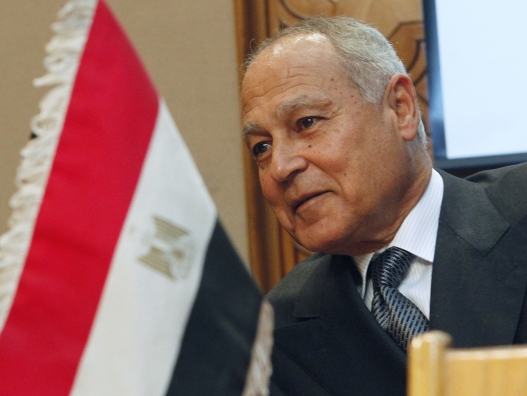 The Arab League announced today that it has chosen former Egyptian Foreign Minister Ahmed Abul Gheit as its new Secretary General. The selection of Abul Gheit is in line with what Ahram Online describes as the league’s traditional practice of electing an Egyptian to serve as the head of the 22-member body. He will succeed current Secretary General, Nabil al-Araby, whose term ends on June 30.
The Arab League announced today that it has chosen former Egyptian Foreign Minister Ahmed Abul Gheit as its new Secretary General. The selection of Abul Gheit is in line with what Ahram Online describes as the league’s traditional practice of electing an Egyptian to serve as the head of the 22-member body. He will succeed current Secretary General, Nabil al-Araby, whose term ends on June 30.
A Career Diplomat
Abul Gheit served as Foreign Minister under former president Hosni Mubarak for seven years from July 2004 until he was forced to resign following the January 2011 uprising. Prior to assuming Egypt’s top diplomatic role, Abul Gheit served as the permanent representative of Egypt to the United Nations from 1999 to 2004 at the UN headquarters in New York. He was also the Chief of Staff to former Egyptian Foreign Minister Amr Moussa, and served as an ambassador to several countries, including Italy and Macedonia.
According to an Ahram Online profile of Abul Gheit, he encouraged Mubarak to address regional challenges, and worked to cement Egypt’s role as a mediator in several high-profile international disputes, including the crisis in Darfur, and the Israeli-Palestinian conflict. Also during his tenure, Egypt enjoyed close ties with Saudi Arabia, which was augmented by both countries’ reluctance to see Qatar assume a more prominent regional role.
Following the 2011 uprisings, which led to the abrupt conclusion of his term as Foreign Minister, Abul Gheit retreated from public life, reemerging during the 2012 presidential elections to endorse Mubarak’s last Prime Minister, Ahmed Shafik, for president. During Morsi’s presidency, Abul Gheit again kept a low profile except to publish his memoirs, titled “My Testimony – Egyptian Foreign Policy: 2004 – 2011,” in 2013. In addition to providing insight into his diplomatic career, the memoirs also provided a look into the last days of Mubarak’s time in office, including the shifting dynamics between Mubarak and his cabinet. More recently, Abul Gheit has expressed his support for current Egyptian President Abdel Fattah al-Sisi, referring to him as “my hero who saved Egypt” in a December 2015 interview.
US-Egypt Relations
Ahram Online’s Dina Ezzat writes that Abul Gheit was able to effectively minimize growing disagreements between the US and Egypt over Egypt’s lack of democratization by working to find common ground with US policy-makers on other regional issues. In working to expand the scope of US-Egyptian cooperation, Abul Gheit prioritized strengthening previously strained relations between Cairo and Washington.
January 25
As protests broke out in Tunisia in 2011, prior to January 25, Abul Gheit described the possibility of the movement spreading across the Arab world as “nonsense.” In his memoir, Abul Gheit later described Mubarak, in the weeks leading to his ouster, as passive, bored, and taking advice only from his son Gamal Mubarak. “The president is very old, and consequently he is dependent on the vision of Gamal Mubarak,” he said. He said that on February 2, as men riding camels and horses attacked the Tahrir sit-in, he spoke to then vice-president and former intelligence chief Omar Suleiman, saying they agreed that Mubarak must step down.
He also wrote of the US response to the January 25 protests that unseated Mubarak, saying, “The White House appears very strict against the government, while [Secretary of State Hillary] Clinton and the State Department show some flexibility.” In an interview with PBS on February 9, two days before Mubarak stepped down, he expressed his discontent with what he described as US officials trying to impose their will on Egypt. “For Americans to come and say ‘change is now,’ but already we are changing! or, ‘you start now,’ we started last week. So better understand the Egyptian sensitivities and better encourage the Egyptians to move forward and to do what is required,” he said. During the interview, he also denied that the February 2 attack on the Tahrir Square sit-in was orchestrated by the government.
In a 2014 interview with talk show host Ahmed Moussa on satellite channel Sada al-Balad, Abul Gheit accused the United States of spending $250 million from 2005 to 2011 on civil society and non-governmental organizations in preparation for the January 25 protests. In another interview on Dream TV, he reiterated these claims, accusing civil society organizations of working on behalf of the United States for western interests in the Middle East. He also said that while Egyptians genuinely wanted a change, which manifested itself in the form of the January 25 uprising, once protests erupted outside forces infiltrated the movement—referring specifically to political Islamic groups, Qatar, and Al-Jazeera.
Arab League Member Countries Stances on Abul Gheit
In the lead-up to the vote for Abul Gheit’s nomination, he garnered support from neighboring Arab states based on his strong stance against Iran and his support of Saudi Arabia. However, Ahram Online quotes unnamed Egyptian diplomats as saying that Egypt had to offer generous diplomatic concessions for Algeria, Sudan and Qatar—three countries allegedly unsupportive of Abul Gheit—in order to secure their support for his candidacy. Daily News Egypt, however, highlighted a statement by the Egyptian Foreign Ministry saying that Foreign Minister Abdelkader Messahel expressed his support for Abul Gheit to his Egyptian counterpart. On the other hand, Bahrain, Kuwait, and Tunisia publicly endorsed his nomination. While he successfully secured unanimous approval from all member countries, diplomats reportedly said the vote was delayed for hours because of Qatar’s reservations.
Margaret Suter is an intern at the Rafik Hariri Center for the Middle East. Follow her on Twitter @MAminishakib
Image: Photo: Ahmed Abul Gheit in December 2010 (Reuters/Asmaa Waguih)
